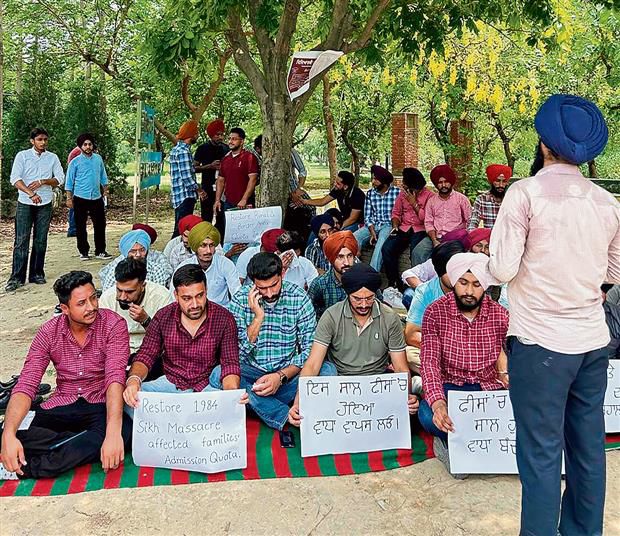GNDU students’ body wants scrapped quota in admissions restored soon
Amritsar, July 25
Continuing their demand to revive the quota in admissions at Guru Nanak Dev University (GNDU) for students hailing from border and rural areas besides wards of families affected during the 1984 anti-Sikh riots, three members of the student organisation Sath today began a hunger strike at the GNDU campus. The organisation, comprising students of the university, had raised the demand for the restoration of quota last week, while also announcing a struggle.
The three students, Jaskaran Singh Zira, Karanveer Singh Virk and Gurvinder Singh Varpal, shared that the quota in admissions was applicable till 2017 and was meant to cater to students from rural and border belt to ensure their right to access to quality education.
“The reservation was abolished for students after 2017. Seven per cent seats were reserved for students from rural belt, three per cent for the border areas and two per cent for students from 1984 anti-Sikh riot affected families in the university admissions. Since 2017, this reservation has been converted to ex-servicemen quota. We are demanding that the quota be revived,” said Jaskaran Singh Zira.
Further, the organisation is also demanding regulation of fee hike at GNDU, which they claim is making higher education out of the reach of students who are from a modest economic background or families with limited income. The average fee at GNDU for any postgraduate, undergraduate or diploma course ranges from Rs 5,000 to Rs 10 lakh per annum, depending on the degree level, duration and specialisation of the course. “Previously as well, the student bodies had demanded that GNDU fee should be regulated. The university fee is high, more than at Punjabi University, Patiala, which is also a state university,” said Jaskaran Singh Zira.
They are also demanding that the university should stop hiring faculty from other states, as it will curb the employment opportunities of deserving candidates from Punjab. Their other demands include constitution of a student council, with elected representatives, to ensure the participation and representation of students. “It should be constituted to review the issues that directly impact students and their access to education,” said Karanveer Singh.









